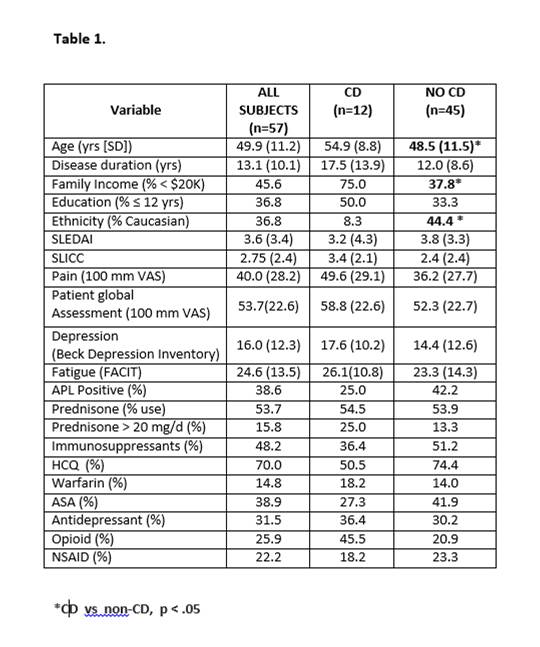Session Information
Session Type: Abstract Submissions (ACR)
Background/Purpose: The pathogenesis of cognitive impairment (CI) in patients with SLE is unknown. Anti-phospholipid antibodies (APL) have been implicated in some studies, but not in others. The APL which have been evaluated have variably included anti-cardiolipin (ACL) antibodies, lupus anticoagulant (LAC), and antibodies to beta-2 glycoprotein I (β2GPI). Few studies have examined all of the above and none has examined other APL (so-called non-criterion APL). We evaluated the association of CI with a broad spectrum of both criterion and non-criterion APL.
Methods: Subjects meeting the revised criteria for classification of SLE were recruited from 3 different patient populations. Cognitive function was assessed with the ANAM (Automated Neuropsychologic Assessment Metrics), a validated computer- based assessment tool which measures multiple cognitive domains. The TTS (total throughput score= number of correct responses/time) was used as the primary outcome measure. It was summed over 8 separate domains. Demographic, clinical, treatment, disease activity and damage information was obtained. The following APL of all three isotypes were assessed by ELISA using standardized techniques: ACL, anti-β2GPI, anti-phosphatidyl ethanolamine (aPE), anti-phosphatidyl choline (aPC), anti-phosphatidyl inositol (aPI), anti-phosphatidyl serine (aPS), anti-phosphatidyl glycerol (aPG), anti-phosphatidic acid (aPA). The data were analyzed by Fisher’s exact test, Wilcoxon rank sum test, and multiple linear regression.
Results: Fifty-seven (57) patients were evaluated. Clinical characteristics are shown in Table 1. Of the 57, 12 had definite CI (<1.5 SD below the mean of an age, sex, and race matched RA population). The two groups were significantly different with regard to age, ethnicity, and family income. There was no significant difference between groups with regard to the presence or absence of any APL, or any specific APL, criterion or non-criterion. When titers of specific APL were compared with TTS, no significant correlations were found. Using multiple linear regression and adjusting for age, ethnicity, income, opioid and hydroxychloroquine use, and simple reaction time, neither the presence nor the titer of any APL significantly decreased TTS. However, the presence of aPG (IgM) (b’= 0.352, p = .0007) and aPA (IgG) (b’=0.242,p=.02) appeared to increase TTS (model R2=.731, p<0.0001).
Conclusion: In this cross-sectional study, neither criterion nor non-criterion APL of any isotype was associated with a significant decrease in cognitive performance as measured by the TTS of the ANAM. Somewhat surprisingly, aPG (IgM) and aPA (IgG) appeared to increase TTS, possibly reflecting protection against other pathogenic factors. Confirmation and further analysis of this finding is in progress.
Disclosure:
M. Luggen,
None;
G. Gulati,
None;
R. Willis,
Louisville APL Diagnostics Inc,
5;
E. B. Gonzalez,
None.
« Back to 2014 ACR/ARHP Annual Meeting
ACR Meeting Abstracts - https://acrabstracts.org/abstract/cognitive-impairment-in-sle-and-non-criterion-anti-phospholipid-antibodies/

